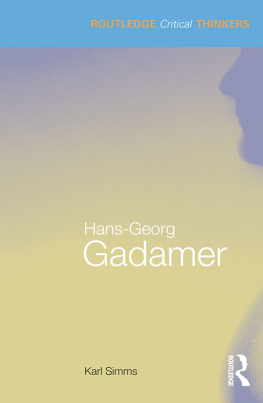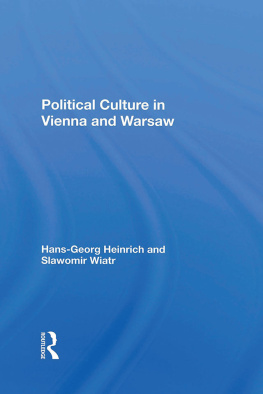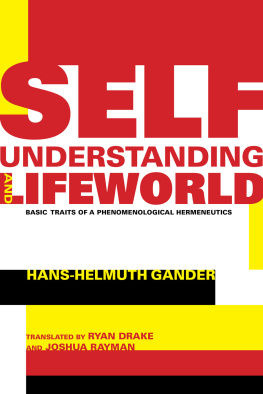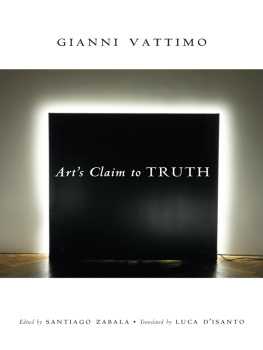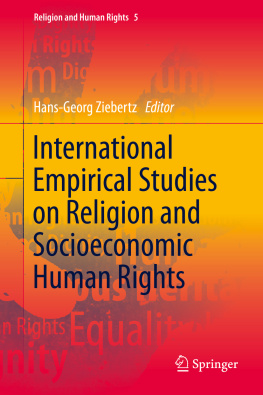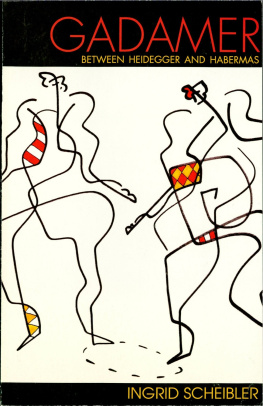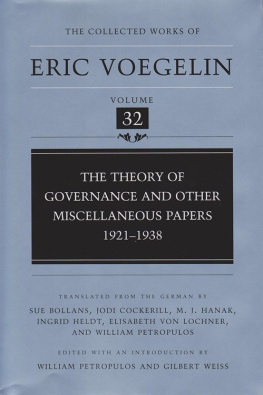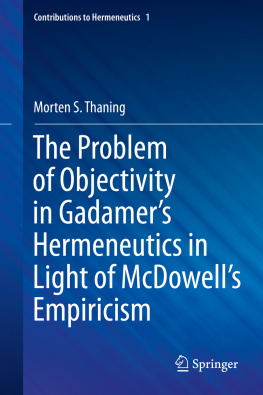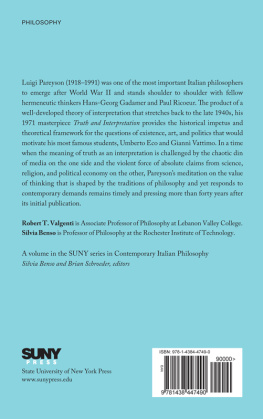HANS-GEORG GADAMER
Hans-Georg Gadamers theory of hermeneutics is one of the most important modern theories of interpretation and understanding, and at its heart is the experience of reading literature. In this clear and comprehensive guide to Gadamers thought, Karl Simms:
presents an overview of Gadamers life and works, outlining his importance to hermeneutic theory and its place in literary studies
explains and puts into context his key ideas, including dialogue, phronsis, play, tradition, and horizon
shows how Gadamers ideas have been influential in the interpretation of literary texts
explains Gadamers debates with key contemporaries and successors, such as Habermas, Ricoeur and Derrida
provides detailed suggestions for further reading.
With a significance that crosses disciplinary boundaries from cultural studies, literary theory and philosophy through to history, music and fine arts, Gadamers pioneering work on hermeneutic theory remains of crucial importance to the study of texts in the humanities.
Karl Simms is Senior Lecturer in English at the University of Liverpool, UK. His other books include the Routledge Critical Thinkers title Paul Ricoeur.
ROUTLEDGE CRITICAL THINKERS
Series Editor: Robert Eaglestone, Royal Holloway, University of London, UK
Routledge Critical Thinkers is a series of accessible introductions to key figures in contemporary critical thought.
With a unique focus on historical and intellectual contexts, the volumes in this series examine important theorists:
significance
motivation
key ideas and their sources
impact on other thinkers
Concluding with extensively annotated guides to further reading, Routledge Critical Thinkers are the students passport to todays most exciting critical thought.
Also available in the series:
Theodor Adorno by Ross Wilson
Giorgio Agamben by Alex Murray
Louis Althusser by Luke Ferretter
Hannah Arendt by Simon Swift
Mikhail Bakhtin by Alistair Renfrew
Roland Barthes by Graham Allen
Jean Baudrillard Second edition by Richard J. Lane
Simone de Beauvoir by Ursula Tidd
Homi K. Bhabha by David Huddart
Maurice Blanchot by Ullrich Haase and William Large
Judith Butler by Sara Salih
Gilles Deleuze by Claire Colebrook
Jacques Derrida by Nicholas Royle
Frantz Fanon by Pramod K. Nayar
Michel Foucault by Sara Mills
Sigmund Freud Second edition by Pamela Thurschwell
Hans-Georg Gadamer by Karl Simms
Paul Gilroy by Paul Williams
Antonio Gramsci by Steve Jones
Stephen Greenblatt by Mark Robson
Stuart Hall by James Procter
Martin Heidegger Second edition by Timothy Clark
Fredric Jameson by Adam Roberts
Julia Kristeva by Nolle McAfee
Jacques Lacan by Sean Homer
F.R. Leavis by Richard Storer
Emmanuel Levinas by Sen Hand
Jean-Franois Lyotard by Simon Malpas
Paul de Man by Martin McQuillan
Friedrich Nietzsche by Lee Spinks
Paul Ricoeur by Karl Simms
Edward Said Second edition by Bill Ashcroft and Pal Ahluwalia
Jean-Paul Sartre by Christine Daigle
Eve Kosofsky Sedgwick by Jason Edwards
Gayatri Chakravorty Spivak by Stephen Morton
Paul Virilio by Ian James
Slavoj iek by Tony Myers
American Theorists of the Novel: Henry James, Lionel Trilling & Wayne C. Booth by Peter Rawlings
Theorists of the Modernist Novel: James Joyce, Dorothy Richardson & Virginia Woolf by Deborah Parsons
Theorists of Modernist Poetry: T.S. Eliot, T.E. Hulme & Ezra Pound by Rebecca Beasley
Feminist Film Theorists: Laura Mulvey, Kaja Silverman, Teresa de Lauretis and Barbara Creed by Shohini Chaudhuri
Cyberculture Theorists: Manuel Castells and Donna Harroway by David Bell
For further information on this series visit: www.routledge.com/books/series/SE0370
HANS-GEORG GADAMER
Karl Simms

First published 2015
by Routledge
2 Park Square, Milton Park, Abingdon, Oxon OX14 4RN
and by Routledge
711 Third Avenue, New York, NY 10017
Routledge is an imprint of the Taylor & Francis Group, an informa business
2015 Karl Simms
The right of Karl Simms to be identified as author of this work has been asserted by him in accordance with sections 77 and 78 of the Copyright, Designs and Patents Act 1988.
All rights reserved. No part of this book may be reprinted or reproduced or utilised in any form or by any electronic, mechanical, or other means, now known or hereafter invented, including photocopying and recording, or in any information storage or retrieval system, without permission in writing from the publishers.
Trademark notice: Product or corporate names may be trademarks or registered trademarks, and are used only for identification and explanation without intent to infringe.
British Library Cataloguing-in-Publication Data
A catalogue record for this book is available from the British Library
Library of Congress Cataloging in Publication Data
Simms, Karl.Hans-Georg Gadamer / Karl Simms.
pages cm. -- (Routledge critical thinkers)
Includes bibliographical references and index.1. Gadamer, Hans-Georg, 1900-2002--Criticism and interpretation. 2. Hermeneutics. 3. Books and reading--Philosophy. 4. Phenomenology. I. Title.
B3248.G34S49 2015
193--dc23
2014032188
ISBN: 978-0-415-49308-6 (hbk)
ISBN: 978-0-415-49309-3 (pbk)
ISBN: 978-0-203-06881-6 (ebk)
WITH LOVE TO MY PARENTS,
OLIVE AND NIGEL SIMMS
CONTENTS
The books in this series offer introductions to major critical thinkers who have influenced literary studies and the humanities. The Routledge Critical Thinkers series provides the books you can turn to first when a new name or concept appears in your studies.
Each book will equip you to approach a key thinkers original texts by explaining their key ideas, putting then into context and, perhaps most importantly, showing you why this thinker is considered to be significant. The emphasis is on concise, clearly written guides which do not presuppose a specialist knowledge. Although the focus is on particular figures, the series stresses that no critical thinker ever existed in a vacuum but, instead, emerged from a broader intellectual, cultural and social history. Finally, these books will act as a bridge between you and the thinkers original texts, not replacing them but rather complementing what they wrote. In some cases, volumes consider small clusters of thinkers, working in the same area, developing similar ideas or influencing each other.
These books are necessary for a number of reasons. In his 1997 autobiography, Not Entitled, the literary critic Frank Kermode wrote of a time in the 1960s:
On beautiful summer lawns, young people lay together all night, recovering from their daytime exertions and listening to a troupe of Balinese musicians. Under their blankets or their sleeping bags, they would chat drowsily about the gurus of the time What they repeated was largely hearsay; hence my lunchtime suggestion, quite impromptu, for a series of short, very cheap books offering authoritative but intelligible introductions to such figures.
There is still a need for authoritative and intelligible introductions. But this series reflects a different world from the 1960s. New thinkers have emerged and the reputations of others have risen and fallen, as new research has developed. New methodologies and challenging ideas have spread through the arts and humanities. The study of literature is no longer if it ever was simply the study and evaluation of poems, novels and plays. It is also the study of ideas, issues and difficulties which arise in any literary text and in its interpretation. Other arts and humanities subjects have changed in analogous ways.
Next page
